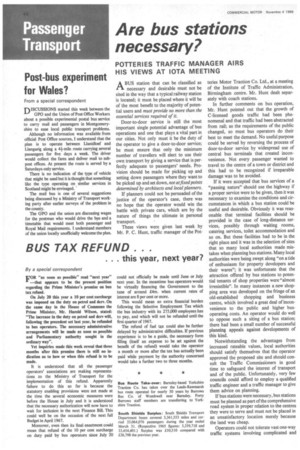BUS TAX REFUND. .
Page 50

If you've noticed an error in this article please click here to report it so we can fix it.
... this year, next year?
By a special correspondent FOR "as soon as possible" read "next year" —that appears to be the present position regarding the Prime Minister's promise on bus tax refund.
On July 20 this year a 10 per cent surcharge was imposed on the duty on petrol and derv. On the same day in the House of Commons the Prime Minister, Mr. Harold Wilson, stated: "The increase in the duty on petrol and dery will, following the precedent set last year, be refunded to bus operators. The necessary administrative arrangements will be made as soon as possible and Parliamentary authority sought in the ordinary way".
Yet inquiries made this week reveal that three months after this promise there is still no indication as to how or when this refund is to be made.
It is understood that all the passenger operators' associations are making representations to the Ministry of Transport for the implementation of this refund. Apparently failure to do this so far is because the statutory enabling provisions were not made at the time the several economic measures were before the House in July and it is understood that the necessary authorization will now have to wait for inclusion in the next Finance Bill. This could well be on the occasion of the next full Budget in April 1967.
Moreover, even then its final enactment could mean that refund of the 10 per cent surcharge on duty paid by bus operators since July 20 could not officially be made until June or July next year. In the meantime bus operators would be virtually financing the Government to the tune of around £4m. when current rates of interest are 8 per cent or more.
This would mean an extra financial burden following the Selective Employment Tax which the bus industry with its 275,000 employees has to pay, and which will not be refunded until the first quarter of 1967.
The refund of fuel tax could also be further delayed by administrative difficulties. If previous experience is to be a guide, the necessary form filling (itself an expense to be set against the benefit of the refund) would take the operator a month or more after the tax has actually been paid while payment by the authority concerned would take a further two to three months.








































































































































































